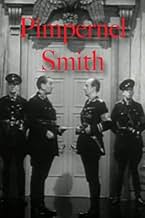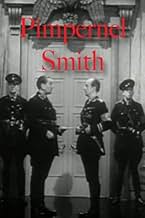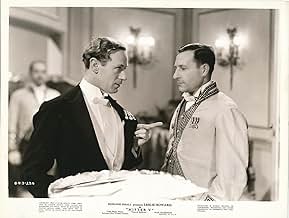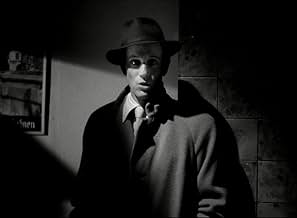Füge eine Handlung in deiner Sprache hinzuProfessor Horatio Smith, while seeming very unassuming, rescues victims of Nazi persecution during World War II.Professor Horatio Smith, while seeming very unassuming, rescues victims of Nazi persecution during World War II.Professor Horatio Smith, while seeming very unassuming, rescues victims of Nazi persecution during World War II.
- Auszeichnungen
- 4 wins total
- General von Graum
- (as Francis Sullivan)
- Clarence Elstead
- (as Lawrence Kitchen)
Empfohlene Bewertungen
Francis Sullivan is General von Graum, the head of the gestapo. He's not a dumb Nazi, but cunning and committed. The large cast includes college students, scientists, underground characters, German soldiers, gestapo men and others. All of the cast are very good in their roles.
Other reviewers discuss the story and actors. Those who are interested in the background of the film and its significance for the time may like more information. The following is a brief overview.
Baroness Emma Orczy de Orci was still alive in 1941 when Leslie Howard and British National Films made this movie. "Pimpernel Smith" borrows its plot, and part of its name, from de Orci's 1903 play and 1905 book. "The Scarlet Pimpernel" was a big hit. In 1934, Howard played Sir Percy Blakeney in the movie of the same title that set the standard for all film versions to follow. Indeed, all but the 1982 TV film with Anthony Andrews in the role, pale in comparison.
In 1940, De Orci had just written the last of a dozen sequels to her original. In the meantime, Scottish author A.G. Macdonell had written a story, "'Pimpernel' Smith," that brought the famous rescuer up to the time of World War II. One wonders if Macdonell, Howard or others consulted de Orci about the 1941 film. Did Howard correspond with her about it? Would she have approved and been pleased?
Howard was interested in a rescue type film against Nazi Germany as early as 1938. After Macdonell's modern "Pimpernel Smith" came out, Howard made this film his project, from start to finish. He co-produced, directed and starred in it. Besides being a first-rate wartime thriller, "Pimpernel Smith" is one of the best propaganda films ever made. It was highly regarded as such from its opening early in WW II.
The movie was released in Great Britain on July 28, 1941, and around the rest of the U.K. in the days that followed. It wasn't released in the U.S. until February 12, 1942, after America had entered the war. But it was a big success there as well as in the U.K. It was the third most popular movie in England in 1941. In the U.S. it was released under the title, "Mister V."
"Pimpernel Smith" may have inspired Sweden's Raoul Wallenberg, whose efforts in 1944 saved many thousand Hungarian Jews from Nazi death camps. Wallenberg's story has been told in several documentaries and two movies. "Wallenberg: A Hero's Story" was a 1985 Paramount movie made for TV. "Good Morning, Mr. Wallenberg" is a Swedish film from 1990.
When "Pimpernel Smith" reached Sweden in November 1943, it was banned by the Swedish Film Censorship Board. The Swedes feared for their continued neutrality during the war because of the portrayal of the Germans in the movie. But, Wallenberg and his sister saw the film at a private screening. She later said that he was impressed by the movie and said he would like to do something like that. Since 1941, he had been traveling frequently to Hungary as a businessman. By 1944, he would be a special envoy for Sweden to Hungary, as well as a contact for the American OSS. He made it his mission to help save Hungarian Jews.
Wallenberg did save many thousand Austrian Jews by giving them Swedish passports and secured housing. But, his fate is unknown. After the Soviet Army took Budapest in 1944, Wallenberg disappeared. He was summoned to Soviet headquarters and was never heard from again. The later movies, books and articles conjecture about his final end. While no one can be sure, and actual evidence has never surfaced as to when or how he died, there's no doubt that he died or was killed while a prisoner of the Soviet Union.
And, Leslie Howard himself would not survive World War II. Howard was too old for military service - he was 46 at the start of WW II in 1939. But, he worked feverishly in his trade against the Nazis. He made several documentaries and starred in a number of World War II films. His other films included "49th Parallel of 1941, "Spitfire" (aka, "First of the Few") of 1942, and "The Gentle Sex" of 1943.
After his last film in America - "Gone With the Wind" of 1939 (in which he plays Ashley Wilkes), Howard returned to England to help with the war effort. But, he was killed on June 1, 1943. He was one of 17 passengers on KLM Royal Dutch Airlines/BOAC Flight 777. It was enroute from Lisbon, Portugal, to Bristol, England, when German fighters shot down the DC-3 over the Bay of Biscay. The plane was off the coast of France, 500 miles West of Bordeaux.
Leslie Howard is one of the great film and stage actors of all time.
If you do look at other comments, a few points: This film is *funny* too! It was not Leslie Howard's last film - 49th Parallel was made later the same year, and First of the Few in 1942, then he subsequently directed 'The Gentle Sex' and 'The Lamp still Burns' in 1943.
Howard was certainly on the Nazi's blacklist, but his death may have been an accident. He was returning from a 'lecture tour' (which was certainly propaganda and may well have had intelligence connotations) via Portugal, and the civilian plane he was on was shot down over the bay of Biscay. It's still not clear if this was an accident or a deliberate target, but if the latter, it's as likely that Howard's accountant, who bore a strong resemblance to Churchill, may have been the target.
Also, look out Violette Cunningham, the assistant in the cosmetic shop. She was Howard's last love - despite still being married to Ruth, he fell for Violette (who also appears in the German dinner scene in 'The First of the Few'). It broke his heart when she died, of cerebral meningitis, in 1942.
In The Scarlet Pimpernel Howard is a Georgian fop as his cover for the dashing, unknown, and elusive pimpernel. Substitute fop for tweedy as he's now an Oxford archeology professor and his cover is a beaut.
One of the Nazi Aryan racial vanities was that way back in the day there was an Aryan civilization. Being the archaeologist he is, Howard's cover is that he's in Germany on a dig, looking for evidence of that selfsame civilization. He even brings along several students as part of the cover.
In one scene Howard is wounded when he's disguised as a scarecrow and a Nazi guard shoots at it to make a point. That does lead to him being found out by his students, one of them being David Tomlinson, later the father in Mary Poppins. To a man, they all decide to stay and help him with his work.
Howard's a bachelor here so he doesn't have wife Merle Oberon and her family dirty laundry to compromise him as he did in The Scarlet Pimpernel. Here he's dealing with Mary Morris who is collaborating with the Nazis to keep her musician father, Peter Gawthorne alive.
Taking the place of Howard's relentless foe Chauvelin as played by Raymond Massey is Francis L. Sullivan as General Von Graum of the Gestapo. Sullivan is a favorite character actor of mine and a joy to watch in any film he does whether a good guy or the baddest of bad guys as he is here.
Leslie Howard directed this film himself and it's interesting to speculate had he survived World War II whether he would have done more work behind rather than in front of the camera. In directing Pimpernel Smith, he certainly had the advantage of knowing his character well.
And you shouldn't pass up an opportunity to get to know him too.
Albeit, very light fair, films like this were more to entertain and keep spirits high in not so certain times. The horrors of war can be looked back upon, but to push onward, the propaganda of the day was to show the enemy as almost comical foes, outwitted by the ever sensible Englishman. Leslie Howard plays this role beautifully and it remains one of my favorite performances by him...
Wusstest du schon
- WissenswertesOne of the earliest movies to openly and unflinchingly discuss Nazi labor, concentration, and death camps.
- PatzerAt the reception in the English embassy, Professor Smith misquotes Lewis Carroll's Jabberwocky. He mispronounces "borogoves" in the third line of the poem as "borogroves".
- Zitate
General von Graum: But we have one problem. "To be or not to be?" as our great German poet said.
Professor Horatio Smith: German? But that's Shakespeare.
Professor Horatio Smith: But you don't know?
Professor Horatio Smith: Why, I know it's Shakespeare. I thought Shakespeare was English.
General von Graum: No, no, no. Shakespeare is a German. Professor Schuessbacher has proved it once and for all.
Professor Horatio Smith: Oh dear, how very upsetting. Still, you must admit that the English translations are most remarkable.
General von Graum: Good night.
Professor Horatio Smith: Good night. Good night. "Parting is such sweet sorrow."
General von Graum: What is that?
Professor Horatio Smith: One of the most famous lines in German literature.
- Crazy CreditsImmediately following the opening credits: "The tale we are about to unfold to you is a fantasy. None of its characters are living persons. But it is based on the exploits of a number of courageous men who were and are still risking their lives daily to aid those unfortunate people of many nationalities who are being persecuted and exterminated by the Nazis. To these champions of freedom this story is dedicated."
- Alternative VersionenThis film was cut and retitled 'Mister V' for its first American release in the early 1940s. Some versions censor the response from Hugh McDermott's character "I'd do my damndest..." in response to a question posed by Leslie Howard's character at a table in a café.
- VerbindungenFeatured in Bilder in Bewegung - Das Jahrhundert des Kinos: Typisch britisch (1995)
Top-Auswahl
- How long is Mister V?Powered by Alexa
Details
- Erscheinungsdatum
- Herkunftsland
- Sprachen
- Auch bekannt als
- Mister V
- Drehorte
- D&P Studios, Denham, Uxbridge, Buckinghamshire, England, Vereinigtes Königreich(as D & P Studios Denham . . . England)
- Produktionsfirma
- Weitere beteiligte Unternehmen bei IMDbPro anzeigen
- Laufzeit
- 2 Std.(120 min)
- Farbe
- Seitenverhältnis
- 1.37 : 1




















